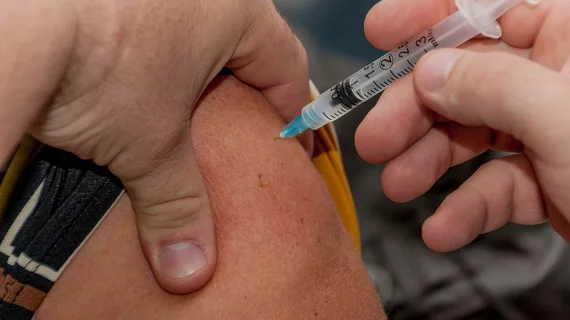Yearly flu shot decreases risk of death for hypertensive patients
Research presented this month at the ESC Congress in Paris suggests that getting a yearly influenza shot could greatly cut hypertensive patients’ risk of dying during flu season.
Daniel Modin, a research associate at the University of Copenhagen in Denmark, and colleagues studied 608,452 Danish citizens across nine flu seasons, tracking how many received flu vaccines and how many died per season. In a release, Modin said that while the influenza virus is a common one—the CDC estimates it affects between 9 million and 49 million patients in the U.S. every year—it can hit heart patients particularly hard.
“Heart attacks and strokes are caused by the rupture of atherosclerotic plaques in the arteries leading to the heart or the brain,” he said. “It is thought that the high levels of acute inflammation induced by influenza infection reduce the stability of plaques and make them more likely to rupture.”
Modin et al.’s study population included patients aged 18 to 100 years, tracked between 2007 and 2016. After adjusting for patient differences, the team reported that, in any given flu season, vaccination was linked to an 18% relative reduction in the risk of dying from any cause. It was also associated with a 16% relative reduction in the risk of dying from any CV cause and a 10% reduction in the risk of dying from heart attack or stroke.
“During the nine flue seasons we studied, vaccine coverage ranged from 26% to 36%, meaning that many patients with high blood pressure were not vaccinated,” Modin noted, adding that it might be beneficial to discuss vaccination with your doctor if you’re a patient with high blood pressure.
“Given these results, it is my belief that all patients with high blood pressure should have an annual flu vaccination. Vaccination is safe, cheap, readily available and decreases influenza infection. On top of that, our study suggests that it could also protect against fatal heart attacks and strokes, and deaths from other causes.”

